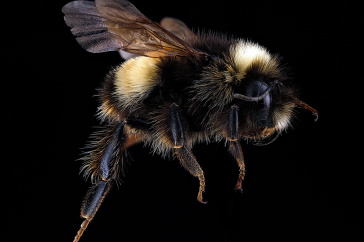The University of New Hampshire is a flagship research university that inspires innovation and transforms lives in our state, nation and world. More than 16,000 students from all 50 states and 71 countries engage with an award-winning faculty in top ranked programs in business, engineering, law, health and human services, liberal arts and the sciences across more than 200 programs of study. UNH’s research portfolio includes partnerships with NASA, NOAA, NSF and NIH, receiving more than $100 million in competitive external funding every year to further explore and define the frontiers of land, sea and space.
UNH Research Finds White Mountain National Forest Home to Nearly 140 Species of Bees

In the national forest, scientists found a relatively high abundance of the yellow-banded bumble bee (Bombus terricola), a species listed by U.S. Fish and Wildlife as a species of greatest conservation need. Credit: Sam Droege/USGS
DURHAM, N.H. – The White Mountain National Forest is home to nearly 140 species of native bees, including two species of native bumble bees that are in decline in the Northeast, according to researchers with the University of New Hampshire who recently completed the first assessment of the state’s native bee population in the national forest.
Sandra Rehan, assistant professor of biological sciences at UNH, and Erika Tucker, USDA research fellow, have identified a broad diversity of species of wild bees in the national forest, including 10 new bee records for the state and three new records for New England.
“Bumble bees are in decline and species are at risk of extinction,” said Rehan, who oversees the UNH Bee Lab. “Bees are important pollinators and the loss of species and populations is of great concern for sustainable agriculture, functional ecosystems, and indicate a larger problem in the environment.”
In the national forest, scientists found a relatively high abundance of the yellow-banded bumble bee (Bombus terricola), a species listed by U.S. Fish and Wildlife as a species of greatest conservation need. They also found one specimen of the golden northern bumble bee (Bombus fervidus). Both of these bumble bees are declining in population in the Northeast and are categorized as vulnerable on the International Union for Conservation of Nature’s Red List.
However, researchers did not find the rusty patch bumble bee (Bombus affinis) or the American bumble bee (Bombus pensylvanicus) in their survey. The rusty patch bumble bee is the first bee species in the continental United States listed as an endangered species and is thought to be locally extinct.
“Bee declines are not only a global and national problem, but very much a reality across New England and here in New Hampshire. This study provides critical information on the habitat and status of species of greatest conservation need. Few biodiversity studies of this kind exist yet are essential for documenting species habitat requirements to preserve remaining pollinator populations,” Rehan said.
Bees are important pollinators of food crops and natural ecosystems. The value of pollination to agriculture is estimated at more than $200 billion a year worldwide. There is little information on wild bees, their habitat requirements and status. Rehan’s lab now has three years of repeated surveys to determine the turnover in bee communities across land use and climate gradients in New Hampshire. The aim of the research is to establish the diversity and status of bees in the state and to provide essential information on the requirements of these species to provide conservation recommendations.
Previously, Rehan and her colleagues completed the first assessment of the state’s native bee population, providing wildlife experts with the first comprehensive list of the Granite State’s more than 100 native bees that includes nearly 20 species that had not been documented in the state before now.
This research is presented in the article “High Elevation Refugia for Bombus terricola Conservation and Wild Bees of the White Mountain National Forest” in the Journal of Insect Science. This material is based upon work supported by the NH Agricultural Experiment Station, through joint funding of the National Institute of Food and Agriculture, U.S. Department of Agriculture, under award number 1004515, and the state of New Hampshire. This study also was made possible through permitting and support of the National Forest Service, NH Fish and Wildlife, and the Appalachian Mountain Club.
Founded in 1887, the NH Agricultural Experiment Station at the UNH College of Life Sciences and Agriculture is UNH’s original research center and an elemental component of New Hampshire's land-grant university heritage and mission.
Editors and reporters: Sandra Rehan can be reached at sandra.rehan@unh.edu.
-
Media Contact
Lori Tyler Gula, PhD | NH Agricultural Experiment Station | lori.gula@unh.edu | 603-862-1452
Latest News
-
May 14, 2024
-
May 7, 2024
-
April 26, 2024
-
April 16, 2024
-
April 16, 2024















































